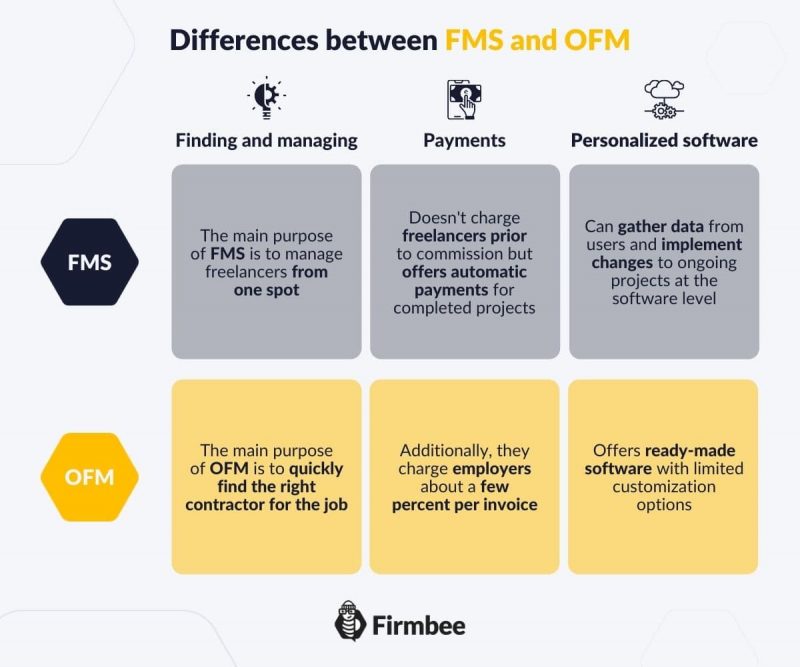With the growth of the freelancer marketplace, various tools have emerged for acquiring independent contractors, as well as for managing the subsequent processes that arise in the later stages of working with them. These tools include two systems. The first is Online Freelancer Marketplaces and the second is Freelance Management Systems.
Online Freelancer Marketplaces vs Freelancer Management Systems – table of content:
Online Freelancer Marketplaces
Knowledge of both OFM and FMS management systems enables drawing a clear line between the two. As we have covered Freelance Management System in our previous publication, without any further ado, let’s take a look at Online Freelancer Marketplaces.
In a nutshell, Online Freelancer Marketplace is a virtual platform where freelancers and employers browse their profiles, one searching for a job and the other for talent. The design of the platform forms a scattered network of independent contractors, without a centralized hub to navigate. Gains apart there are is a nuisance connected to lengthening the process of recruitment taking way much time than before for finding the right one.
Most relationships develop through word-of-mouth referrals or sent private messages between employers and contractors. OFMs have tools for working with freelancers such as the ability for contractors to create profiles where they describe their work experience and availability, as well as appropriate channels for communicating with them.
Online Freelancer Marketplaces are effective platforms for job-seeking freelancers and the right place for companies to find professionals. Both parties take plenty of advantages from these marketplaces. One of the most popular OFMs so far is Fiverr, where you can find workers from all over the world.
Differences between FMS and OFM
- Finding and managing
- Payments
- Personalized software
The main purpose of FMS is to manage freelancers from one spot. This allows you to automate many processes such as billing and payments, to name a few. Thanks to one centralized place, it enables create reports on the work done and constantly track their progress.
The main purpose of OFM, on the other hand, is to quickly find the right contractor for the job. These exchanges are used for simple accounting of projects along with a discussion of rates for their execution.
Freelancer marketplaces (OFMs) sometimes charge freelancers as much as 20-30% for a completed assignment. Additionally, they charge employers about a few percent per invoice. This results in frequent reconciliation of work and payment outside this market.
Freelancer management systems (FMS) not only do not charge freelancers prior to commission but offer automatic payments for completed projects. All you have to do is provide a summary of your work so that the employer checks and evaluates its correctness, and the system will automatically pay you for the work.
FMS systems can gather data from users and implement changes to ongoing projects at the software level. Moreover, they offer the possibility of constant access to ongoing work with the use of built-in tools. Freelance marketplaces, on the other hand, offer ready-made software with limited customization options. All in all, we recommend that those enterprises that organize small and seasonal projects should pick OFM, while larger businesses looking for more extensive software should go for FMS.

Summary
Both FMS and OFM look and work similarly at first glance. However, considering the above aspects, we can safely say that Freelance Management System is a much more powerful tool that offers work organization at every stage of contact with freelancers. Online Freelancer Marketplaces, on the other hand, is a closed ecosystem for finding the right talent.
It provides access to a community of independent contractors, while a freelancer management system allows you to manage the available pool of independent contractors along with powerful tools such as automatic payments or integration with HR and other financial systems. The FMS is therefore a much more powerful tool with greater customization capabilities.
Check out our articles about Freelance Management System:
- Features of a good Freelance Management System
- 6 Best Freelance Management Systems
- Who needs a FMS?
- How do Freelance Management Systems help at work?
If you like our content, join our busy bees community on Facebook, Twitter and Linkedin.
Author: Mira Bodhi
Knows all the pros and cons of working as a Freelancer and still makes the best of it. Time management and self-motivation are her biggest advantages. She is now a digital nomad and works traveling all over the world.


















